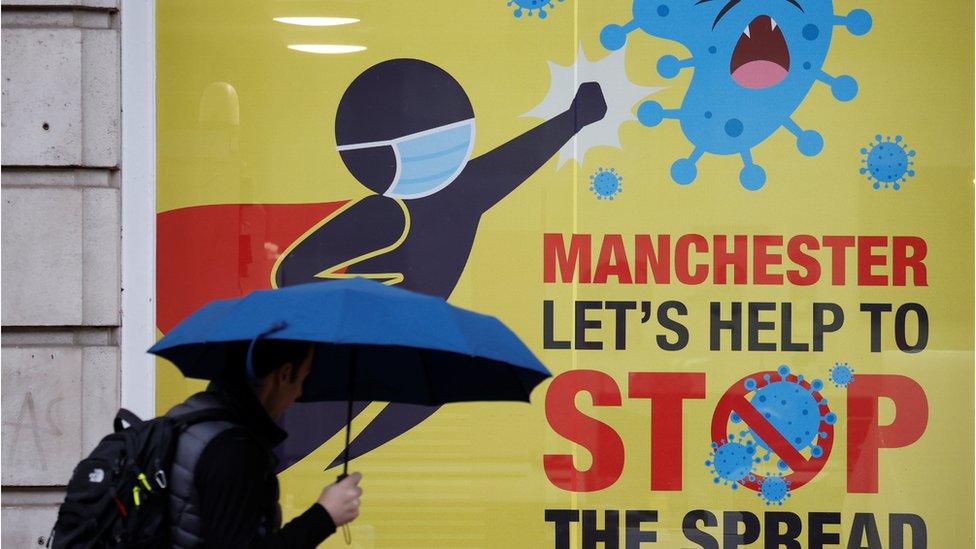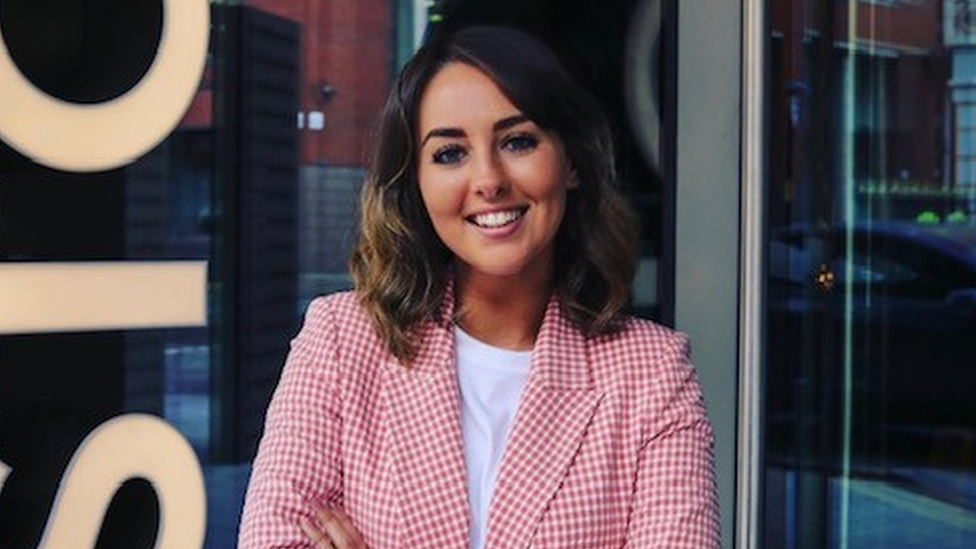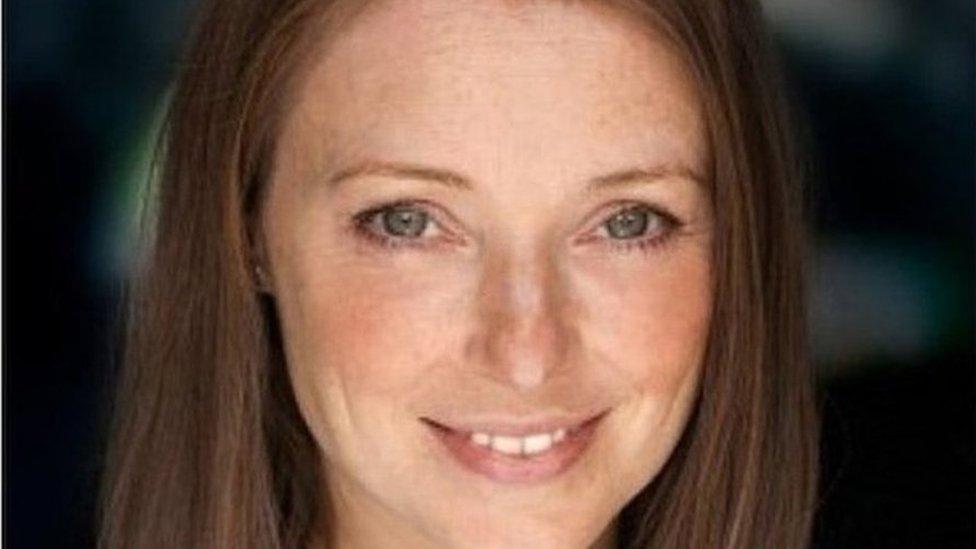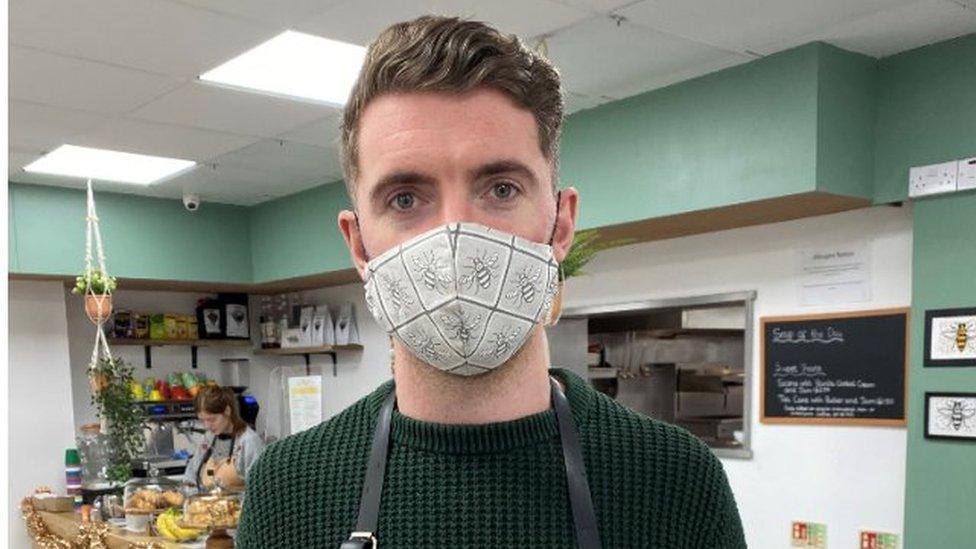Coronavirus: Greater Manchester remains in tier 3 restrictions
- Published
- comments

Greater Manchester was first placed in tier three on 23 October
Greater Manchester is to remain in the toughest tier of Covid-19 restrictions.
Regional leaders had "pressed very hard" to have restrictions eased after the area was placed into tier three following England's second national lockdown, which ended on 2 December.
The area was first placed in tier three on 23 October, and has had restrictions on groups meeting indoors since July.
Greater Manchester Mayor Andy Burnham said he was "disappointed and frustrated".
Health Secretary Matt Hancock earlier announced changes to restrictions for several areas in a statement to the Commons.
Mr Burnham said now London and the South East were seeing rises, the "whole country has restrictions", adding: "It doesn't feel even-handed."
'Bitterly disappointed'
Mr Burnham said the government had "got in a mix up over Christmas" and easing of rules to allow people to mix with wider groups of friends and families had "led to more caution".
He said "people in Greater Manchester have put up with a lot and they have every right to feel frustrated" but he urged them to continue to follow the rules.
Sir Richard Leese, leader of Manchester City Council, said he was "bitterly disappointed".
He tweeted, external: "Even though our numbers are better than either London or Liverpool's were three weeks ago, still in Tier 3. Unbelievable!"
Mr Hancock said "no-one wants tougher restrictions any longer than necessary".
However, he added "these are always the most difficult months for people's health" and we "must keep suppressing this virus".
From 00:01 on Saturday, 68% of England's population - 38 million people - will be living in tier three.

What are tier three (very high) rules?
You cannot mix indoors, in private gardens or in most outdoor venues, except with your household or bubble
You can meet in a group of up to six in other outdoor spaces, such as parks, beaches or countryside
Shops, gyms and personal care services (such as hairdressing) can stay open
Bars, pubs, cafes and restaurants must stay closed, except for delivery and takeaway
Sports fans cannot attend events in stadiums
Indoor entertainment venues - such as theatres, bowling alleys and cinemas - must stay closed
People are advised not to travel to and from tier three areas


Becky Wilkes said remaining in tier three restrictions was "heartbreaking" for hospitality
Becky Wilkes, a restaurant and bar owner in Manchester, said businesses were under mounting "pressure and strain" and many had been "hoping for a Christmas miracle".
"I know hundreds of people who have lost jobs - from bar tenders to senior sales managers, as well as events managers and wedding coordinators because there is no demand," she said.
Night-time economic advisor Sacha Lord said he was "gutted" for hospitality and many people now faced "upset, worry and stress".
He said closing pubs would "push people to socialise indoors".

Actor Rebecca Fenwick said the restrictions were "hard" but she hoped for a "light at the end of the tunnel"
Actor Rebecca Fenwick from Stockport, who has only had the "occasional job here and there" since March, said the restrictions were "hard" but she hoped they would "bring the light at the end of the tunnel a little bit closer".
Only Bristol and North Somerset will move from tier three to tier two.
Labour MP for Manchester Lucy Powell said it felt like the "goalposts were moving".
She tweeted, external: "Many of our rates are lower than Bristol and we've been in restrictions for longer. Yet again, it doesn't feel like these things are fairly applied."
Chris Govin, owner of Honeypot cafe in Monton, said he was "frustrated" by the decision but he was "expecting it".
"When you can go into the shops and gyms, in some cases 24 hours a day, but you can't walk in here and sit at a sanitised table away from people, it doesn't make sense," he said.

Chris Govin said it was a "struggle" running his cafe as a takeaway in tier three
He said keeping the business going as a takeaway was a "struggle" and he was concerned that people would not follow the rules at Christmas and it may lead to continued closure in January and February.
"We're doing our best to diversify and survive, but we need people through the doors," Mr Govin added.
Graham Brady, chairman of the Conservatives' backbench 1922 Committee, questioned what it would take for Greater Manchester to have restrictions eased.
"That statement will be greeted with dismay in Greater Manchester where we have had severe restrictions for nine months, where in nine of the ten boroughs rates are below the national average."

Why not follow BBC North West on Facebook, external, Twitter, external and Instagram, external? You can also send story ideas to northwest.newsonline@bbc.co.uk, external